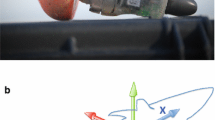Abstract
Stomach temperature loggers have proved useful for the study of feeding activity in free-living seabirds, but their usage has been restricted because they are frequently dislodged and lost during the seabirds' regular regurgitation of indigestible prey remains. In the present study we examine the incidence of spontaneous regurgitation (pellet production) in free-living seabirds, consider the effect this has on the likely retrieval of stomach temperature loggers and present a structural modification of the logger housings which leads to a much lower incidence of regurgitation. Systems were tested on albatrosses, cormorants, gannets and penguins.
Similar content being viewed by others
Author information
Authors and Affiliations
Additional information
Received: 15 July 1997 / Accepted: 31 October 1997
Rights and permissions
About this article
Cite this article
Wilson, R., Peters, G., Regel, J. et al. Short retention times of stomach temperature loggers in free-living seabirds: is there hope in the spring?. Marine Biology 130, 559–566 (1998). https://doi.org/10.1007/s002270050277
Issue Date:
DOI: https://doi.org/10.1007/s002270050277




